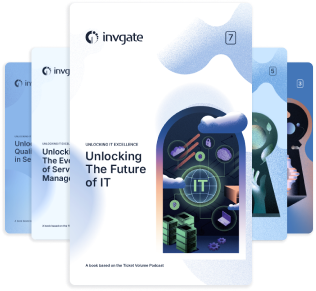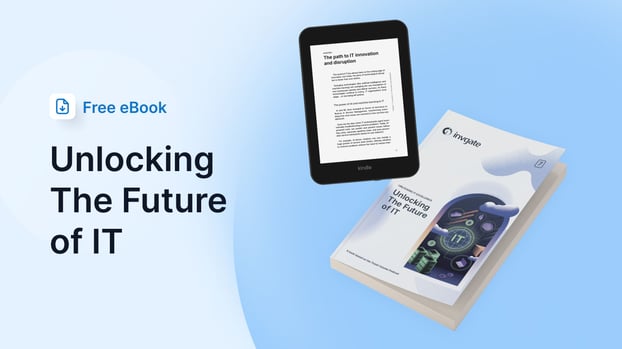IT Service Management (ITSM) is undergoing a seismic transformation. The future of ITSM is fueled by cutting-edge technologies like Artificial Intelligence and Machine Learning. These technologies promise to revolutionize how services are delivered, automating routine tasks and providing predictive insights that allow for proactive problem-solving. However, with this surge in innovation comes the challenge of maintaining reliability, efficiency, and the human touch that defines exceptional service.
The pressure to future-proof business processes has never been higher. As the pace of technological disruption continues to accelerate, it’s not just about adopting the latest tools -- it’s about creating a balanced strategy that blends the benefits of new innovations with a robust ITSM framework.
This requires IT leaders to adopt a proactive mindset, ensuring that they not only integrate new technologies but also maintain strong service delivery standards that meet evolving customer expectations.
The key to thriving in this landscape is a multifaceted approach. It’s about more than just adding AI or automating workflows -- it’s about fostering leadership that can drive change, leveraging frameworks like ITIL and DevOps to ensure operational stability, and, perhaps most importantly, focusing on the end-user. A customer-centric approach that prioritizes user experience, emotional connection, and long-term trust is what will truly set IT leaders apart.
In this blog post, we’ll dive into how you can stay ahead of the curve by blending innovation with strategic leadership, adapting frameworks to modern needs, and developing customer-centric service models. These insights will help you future-proof your IT operations and ensure your business remains agile in an increasingly fast-paced world.
For a deeper dive into the trends shaping the future of ITSM, we invite you to download our latest Ticket Volume eBook, “Unlocking the Future of IT: Keys to Innovation, Disruption, and Future-Proofing.”
This comprehensive guide covers the key strategies needed to thrive in the next era of ITSM.
Download 'Unlocking the Future of IT' for Free!
Get ahead of the curve with our latest eBook, “Unlocking the Future of IT: Keys to Innovation, Disruption, and Future-Proofing.” This comprehensive guide offers expert insights on how to navigate the evolving IT landscape, integrate cutting-edge technologies like AI and Machine Learning, and prepare your organization for ongoing disruption.
Inside, you’ll discover practical advice from industry leaders, a roadmap for adopting new technologies, and strategies to build a resilient, future-ready IT operation. Whether you're an IT manager, team leader, or CIO, this eBook will equip you with the tools you need to innovate and stay ahead of the competition.
Unlocking The Future of IT
Discover the knowledge you need to prepare for the next era of Service Management.
Download for free
The state of IT Service Management
ITSM has evolved significantly, with frameworks like ITIL and methodologies such as DevOps providing a solid foundation for aligning IT operations with business objectives. These frameworks have been instrumental in standardizing processes, improving efficiency, and driving better collaboration between IT and other business units. But in today’s fast-moving landscape, simply adhering to established principles is no longer enough.
Technological innovation is accelerating at a pace we’ve never seen before, and IT organizations are under increasing pressure to not only keep up but lead the charge. AI, automation, and data analytics are reshaping the delivery of IT services, creating opportunities for efficiency gains, predictive capabilities, and enhanced customer experiences.
At the same time, these advancements introduce new complexities. Legacy systems that once served as the backbone of IT operations now pose integration challenges, and data privacy concerns are at an all-time high as organizations handle larger and more sensitive data sets.
To thrive in this new era, IT leaders must rethink their approach. It’s not just about implementing the latest technologies, but about combining innovation with the core principles of service management. This means leveraging the power of AI and automation while staying grounded in customer-centric strategies and maintaining a strong focus on governance, security, and compliance. The future of ITSM is dynamic, and those who can skillfully blend the old with the new will be best positioned to navigate the challenges and seize the opportunities that lie ahead.
The Future of ITSM: 5 Trends to Look Out For
As covered in Unlocking the Future of IT, the following key trends are shaping the future of IT Service Management:
1. AI and Machine Learning revolutionize Service Management
AI and Machine Learning (ML) are no longer just buzzwords; they are transforming the very fabric of IT operations. From automating repetitive tasks to enabling predictive maintenance, AI and ML are allowing IT teams to focus on more strategic, high-value work. But the most successful implementations of AI in service management do not replace human effort; they enhance it by acting as a co-pilot.
|
|
"When you have a major incident and get flooded with similar tickets, your agents get frustrated because they need to handle all these tickets, but they’re all pretty much the same. If you can detect the major incident early, alert the relevant person, and solve it quickly while allowing the agents to handle everything as if it were a single ticket, it’s amazing the level of productivity you can achieve. Daniel Ciolek |
2. Embracing change as the new constant
In the future of ITSM, rapid change will no longer be an occasional disruption but the standard state of being. As Rob England emphasized, organizations must embrace volatility and complexity, shifting from a mindset of stability to one of adaptability. Rather than resisting change, IT teams need to build flexible frameworks that allow for continuous evolution, enabling them to thrive in an environment where innovation, technology, and customer expectations are constantly in flux.
|
|
"The key to Service Management is understanding that change is the permanent condition in which we work, not an event. We need to invert our thinking, let go of command and control, and focus more on enabling people. It’s about accepting that the world is not a stable place and embracing complexity while creating an environment where humans manage themselves and their services in real-time." Rob England |
3. Customer-centric service delivery
In the future of IT, customer sentiment will outweigh operational efficiency. Metrics like first-contact resolution times will become less relevant compared to how customers feel about the service they receive. IT organizations must build stronger emotional connections with users, moving away from transactional interactions and towards lasting relationships.
4. Multi-framework integration
The future of ITSM will require a blend of frameworks. ITIL, DevOps, and others will no longer function in isolation but will work together to deliver seamless, secure, and agile service management. A multi-framework approach will allow organizations to adapt more flexibly to evolving challenges.
5. Agnostic AI for IT Flexibility
The future of ITSM will be shaped by the rise of agnostic AI, which allows organizations to break free from vendor lock-in and adopt more flexible, adaptable AI solutions. Instead of relying on a single provider, agnostic AI enables IT teams to integrate multiple AI tools, choosing the best solutions for specific tasks without being tied to one ecosystem.
This approach ensures that organizations can evolve and adopt new technologies as they emerge, maintaining agility in a rapidly changing environment. Agnostic AI also empowers IT leaders to scale AI across departments, combining different models and frameworks to address unique challenges. As AI continues to advance, this flexibility will be essential for staying competitive while avoiding the pitfalls of relying too heavily on one provider's technology
Prepare for the future of ITSM
To thrive in this era of rapid technological change, organizations need more than just innovative tools; they need strong leadership, adaptable frameworks, and a customer-centric mindset. Our eBook, "Unlocking the Future of IT," provides a comprehensive roadmap for navigating this complex landscape. Don’t miss out on expert advice and strategies to future-proof your IT operations -- download it for free today!















